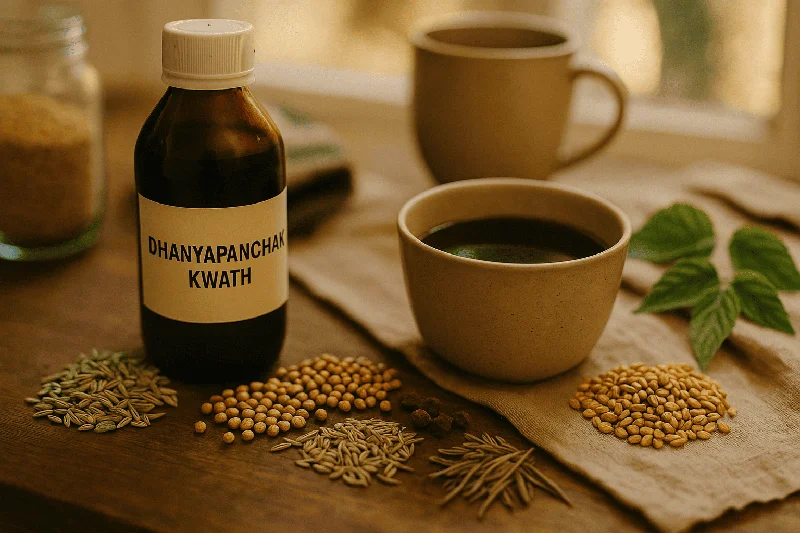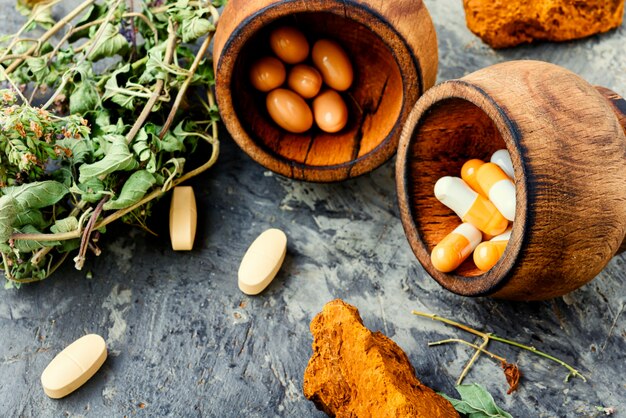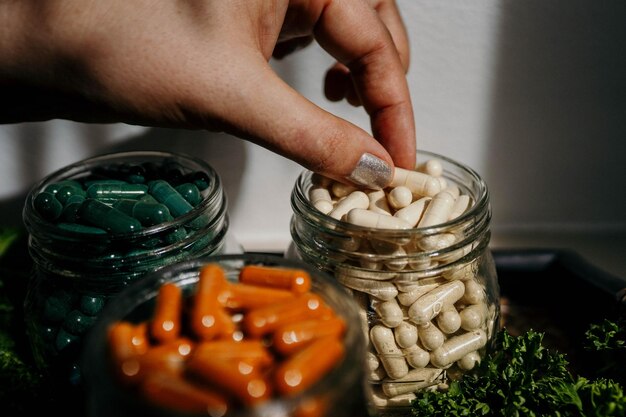Ask Ayurvedic doctor a question and get a consultation online on the problem of your concern in a free or paid mode. More than 2,000 experienced doctors work and wait for your questions on our site and help users to solve their health problems every day.
Dhanyapanchak Kwath – Traditional Ayurvedic Decoction for Digestive Harmony

Introduction to Dhanyapanchak Kwath
Dhanyapanchak Kwath is a revered Ayurvedic decoction designed to support digestive health and detoxification. Rooted in ancient wisdom, dhanyapanchak kwath combines a blend of selected herbs to stimulate the digestive fire (Agni), promote the elimination of toxins (ama), and balance the body's doshas. Incorporating this potent herbal remedy into your daily regimen can lead to improved metabolism, enhanced nutrient absorption, and overall vitality.
Don't wait or self medicate. Start chat with Doctor NOW
Historical Roots & Ayurvedic Significance
Dating back centuries, dhanyapanchak kwath has been mentioned in classical Ayurvedic texts as a key remedy for maintaining digestive equilibrium and addressing metabolic disorders. Traditionally, this decoction was used to prevent digestive stagnation and support the body’s natural detoxification processes. Its significance lies in its ability to restore harmony by balancing the Pitta and Kapha doshas, which are often implicated in digestive irregularities.
Key Components & Therapeutic Benefits
Herbal Composition
The formulation of dhanyapanchak kwath is based on a synergistic blend of herbs, each chosen for its unique therapeutic properties. Common ingredients include:
- Coriander (Dhanya): A powerful herb known for its carminative and digestive properties.
- Cumin (Jeera): Helps stimulate digestion and alleviates bloating and gas.
- Fennel (Saunf): Supports smooth digestion and relieves discomfort.
- Fenugreek (Methi): Promotes healthy digestion and regulates blood sugar levels.
- Additional herbs: May include other digestive aids that contribute to detoxification and dosha balance.
Detoxification & Dosha Balancing
Dhanyapanchak kwath works by activating the digestive fire and enhancing bile production, which together facilitate the breakdown and assimilation of food. This process helps clear accumulated toxins (ama) and brings balance to the Pitta and Kapha doshas. Regular use of this decoction can result in smoother digestion, reduced acidity, and overall metabolic rejuvenation.
Digestive Health & Metabolic Support
The therapeutic benefits of dhanyapanchak kwath extend beyond detoxification. By stimulating Agni, the decoction enhances nutrient absorption and aids in weight management. It also plays a supportive role in managing symptoms of indigestion, bloating, and gas, ensuring a balanced and efficient digestive system.
Holistic Rejuvenation & Wellness
Beyond its digestive benefits, dhanyapanchak kwath is valued for its ability to rejuvenate the body. The blend of herbs not only detoxifies but also provides antioxidant support, reducing oxidative stress and promoting long-term health. This comprehensive approach aids in maintaining overall wellness and vitality.
How Dhanyapanchak Kwath Works: The Science Behind the Decoction
The efficacy of dhanyapanchak kwath lies in its ability to stimulate the digestive enzymes and promote efficient bile secretion. The bioactive compounds in its herbal ingredients work synergistically to enhance digestive processes, clear toxins, and modulate inflammatory responses. This natural mechanism restores balance at a cellular level, ensuring that the body functions optimally and remains resilient against metabolic disturbances.
Choosing the Right Ayurvedic Remedies & Guidance
When considering dhanyapanchak kwath, it is important to:
- Consult Certified Ayurvedic Practitioners: Personalized advice based on your unique constitution (Prakriti) ensures safe and effective use.
- Opt for Quality Herbal Formulations: Ensure the decoction is prepared with authentic, organic herbs to maximize its benefits.
- Source from Reputable Vendors: Purchase dhanyapanchak kwath from trusted Ayurvedic pharmacies or practitioners to guarantee purity and efficacy.
Recommended Dosage & How to Use Dhanyapanchak Kwath
The dosage of dhanyapanchak kwath may vary depending on individual health conditions and practitioner recommendations. Generally:
- Dosage Guidelines: A typical dose ranges from 1 to 2 teaspoons of the decoction, taken with warm water.
- Method of Consumption: It is best consumed on an empty stomach in the morning or as advised by your Ayurvedic expert. Adjustments can be made based on your digestive strength and overall health.
- Professional Guidance: Always adhere to the dosage and usage instructions provided by a qualified Ayurvedic practitioner to tailor the regimen to your specific needs.
Potential Side Effects & Precautions
While dhanyapanchak kwath is generally well-tolerated, it is important to observe a few precautions:
- Digestive Sensitivity: Some individuals may experience mild digestive discomfort initially. Starting with a lower dose and gradually increasing it is recommended.
- Individual Health Conditions: Those with specific digestive disorders or who are pregnant or nursing should consult a healthcare professional before starting any new herbal treatment.
- Allergic Reactions: Discontinue use if any allergic reactions occur and seek professional advice immediately.
Frequently Asked Questions for Dhanyapanchak Kwath
How does Dhanyapanchak Kwath promote digestive health?
Dhanyapanchak Kwath stimulates digestive enzymes and bile production, enhancing nutrient absorption and eliminating toxins. This process supports a healthy digestive system and balances the doshas.
What are the key herbs in Dhanyapanchak Kwath?
Key ingredients include Coriander, Cumin, Fennel, and Fenugreek. These herbs work synergistically to support digestion, detoxification, and overall metabolic health.
How long does it take to see results from Dhanyapanchak Kwath?
Results may vary by individual. Many users experience improved digestion and reduced bloating within a few weeks, while long-term use can further enhance overall wellness.
Can Dhanyapanchak Kwath be combined with other Ayurvedic treatments?
Yes, it is often integrated with other Ayurvedic therapies such as Panchakarma, dietary adjustments, and lifestyle modifications to maximize its benefits.
Are there any dietary recommendations while using Dhanyapanchak Kwath?
A balanced diet rich in fresh fruits, vegetables, whole grains, and herbal teas is recommended. Avoiding processed and heavy foods can further enhance the decoction’s detoxifying effects.
What precautions should I take when starting Dhanyapanchak Kwath?
Begin with a lower dose to monitor your body’s response, and consult a certified Ayurvedic practitioner, especially if you have pre-existing conditions or are taking other medications.
Where can I purchase authentic Dhanyapanchak Kwath?
Authentic Dhanyapanchak Kwath can be sourced from certified Ayurvedic pharmacies and trusted practitioners. Always verify the quality and organic certification of the herbs used.
Conclusion & Expert Insights
Dhanyapanchak Kwath is a traditional Ayurvedic decoction that offers a natural and effective approach to digestive detoxification and metabolic health. By stimulating the digestive fire and eliminating toxins, this time-tested remedy helps balance the doshas and rejuvenate the body. Embracing dhanyapanchak kwath under professional guidance can pave the way for a healthier, more balanced life, rooted in the ancient wisdom of Ayurveda.
References & Further Reading
- Sharma, P.V. (1995). Ayurvedic Healing: A Comprehensive Guide.
- Lad, V. (2002). Ayurveda: The Science of Self-Healing.
- National Institute of Ayurveda:
- Journal of Ayurveda and Integrative Medicine for contemporary research on digestive health and herbal detoxification.



